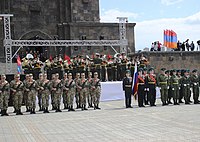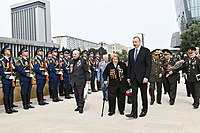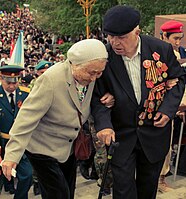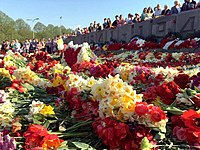Victory Day (9 May)
Victory Day[a 1] is a holiday that commemorates the Soviet victory over Nazi Germany in 1945. It was first inaugurated in the 15 republics of the Soviet Union following the signing of the German Instrument of Surrender late in the evening on 8 May 1945 (9 May Moscow Time).[a] The Soviet government announced the victory early on 9 May after the signing ceremony in Berlin.[1] Although the official inauguration occurred in 1945, the holiday became a non-labor day only in 1965, and only in certain Soviet republics.
For the song, see Den Pobedy.Victory Day
Russia and some former states of Soviet Union, Bosnia and Herzegovina, Montenegro, North Macedonia, Serbia, Israel, and Mongolia
9 May 2024
Annual
In East Germany, 8 May was observed as Liberation Day from 1950 to 1966, and was celebrated again on the 40th anniversary in 1985. In 1967, a Soviet-style "Victory Day" was celebrated on 8 May. Since 2002, the German state of Mecklenburg-Vorpommern has observed a commemoration day known as the Day of Liberation from National Socialism, and the End of the Second World War.[2]
The Russian Federation has officially recognized 9 May since its formation in 1991 and considers it a non-working holiday even if it falls on a weekend (in which case any following Monday will be a non-working holiday). The holiday was similarly celebrated there while the country was part of the Soviet Union. Most other countries in Europe observe Victory in Europe Day (often abbreviated to VE Day, or V-E Day) on 8 May, and Europe Day[b] on 9 May as national remembrance or victory days.










![Decoration of Moscow with flags for Victory Day, 9 May 2021[81]](http://upload.wikimedia.org/wikipedia/commons/thumb/1/11/9may-2.jpg/200px-9may-2.jpg)
